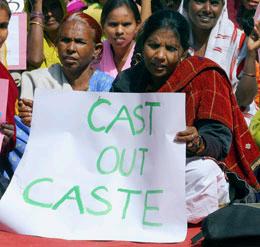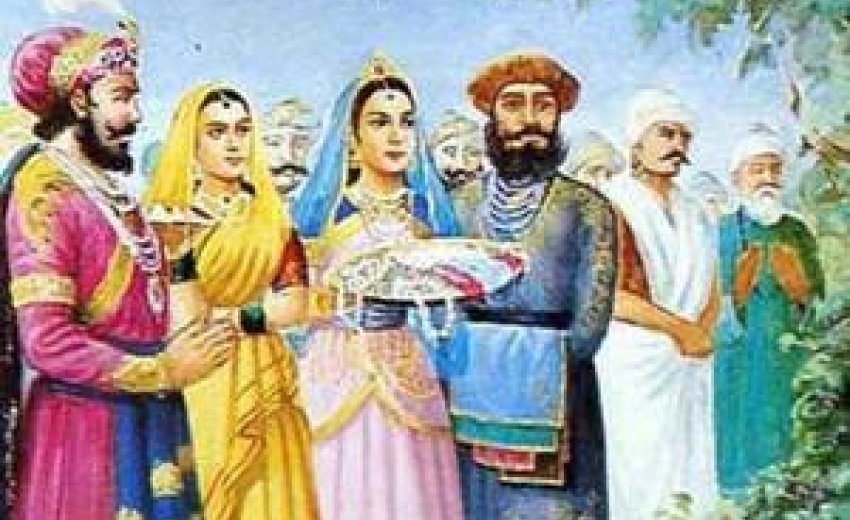 We
might as well just divide the moon, sun, mother earth and while we are at it;
and our Gurdwaras as well.
We
might as well just divide the moon, sun, mother earth and while we are at it;
and our Gurdwaras as well.
The caste system has always had me puzzled with regard to
the function it serves. To begin with, we need to understand that we as
Punjabi Sikhs, often refer to our origin and our identity as one
characteristic rather than two. Being a Sikh and being a Punjabi are two
completely different things. Theoretically, as Punjabis, the caste system is
given much consideration and looked at with an open mind. However, through
glances within the Gurbani, we see that the caste system is firmly despised in the
Sikh faith. As a matter of fact, the very pillars of Sikhism were set upon equality, autonomy and spirituality.
We frequently look over these prime
factors of our faith and head into what Sikhism was in opposition to - the very concept
of the caste system. Hinduism and Islam were both great religions (that is
subtracting the poverty, corruption and violence found in every faith.) Guru
Nanak Dev Ji could have chosen to follow and be a prophet of either creed, yet he
didn’t. The reason for that being that both faiths stoutly relied on
the caste system. This classification of inferiority and superiority tore apart
the livelihood, faith and optimism of many. Those belonging to the subordinate
parts of the pyramid lived lives equivalent to that of a street dog. Those at
the top of the hierarchy, lived lives analogous to that of a great King.
“In the dwelling of the womb, there is no ancestry or social status. All have originated from the seed of God. Tell me, O Pandit, O religious scholar: since when have you been a Brahmin? Don't waste your life by continually claiming to be a Brahmin. If you are indeed a Brahmin, born of a Brahmin mother, then why didn't you come by some other way? How is it that you are a Brahmin, and I am of a low social status? How is it that I am formed of blood, and you are made of milk? Says Kabeer, one who contemplates God, is said to be a Brahmin among us.” --- Guru Granth Sahib Ji (page/Ang 324) ---
So far, one thing is clear, Sikhi
for one, does not approve of this arrangement. However, what causes our
youngsters (who are for the most part well-educated) to fall for it? On what basis does this system continue till today? Is it a lack of education? A strong need of unbiased
parental guidance? A laack of understanding regarding Sikhi? Simply an ignorant
mind-set? Or is it the large sense of influence this form of discrimination plays
around us? Possibly, it is a bit of all of these. But our cultural atmosphere may have the largest impact on this way of thinking.
Look around yourself; we have
such a large influence through the media; T.V., movies, shows, music, news, etc. To phrase it properly, we have a rigid affiliation with this classification.
Technically speaking, if you listen to a Punjabi song, you will hear the term “Jatt”
after every other word. The same applies to a Punjabi movie, certain castes
will be brought up every now and again. A while back, a friend told me about an
encounter he had with a young man a couple of years ago. Not knowing much about
Sikhi then, he asked that teenager what his last name was. The boy replied, “I
can’t say. It’s too embarrassing. All I can tell you is that it’s not a “Jatt”
last name.” Shame? Why? We are either humiliated by, or we brag about
something that is not supposed to even exist! It is equivalent to a child’s
imaginary friend - a sense of support that he or she needs in order to please
herself or himself.
“There are four castes: Brahmin, Kh'shaatriya, Soodra and Vaishya, and there are four stages of life. One who meditates on the Lord, is the most distinguished and renowned. The poor castor oil plant, growing near the sandalwood tree, becomes fragrant; in the same way, the sinner, associating with the Saints, becomes acceptable and approved. He, within whose heart the Lord abides, is the highest of all, and the purest of all. Servant Nanak washes the feet at humble servant of the Lord; he may be from a low class family, but he is now the Lord's servant.” --- Guru Granth Sahib Ji (Ang 861) ---
- Gurdwara (Sikh Temple): All devotees sit at ground level embodying the equality between all beings.
- Amrit Sanchaar: Eveyone, regardless of caste, colour, creed and personal beliefs, joins together in order to celebrate their union with God = equality. During the baptism ceremony, everyone sips the holy nectar out of the same “baata” (bowl)= equality.
- The Panj Pyare: During Guru Gobind Singh Ji’s time, when he had called forth the Panj Pyare, he did not ask about their religion, creed, caste, nor their personal beliefs prior to their stand = equality.
There are hundreds of other reasons that we can make use of in making this point; however, if we are true Gursikhs, Guru Sahib’s own words ought to be enough.
“The religious rites, rituals and hypocrisies which are seen, are plundered by the Messenger of Death, the ultimate tax collector. In the state of Nirvaanaa, sing the Kirtan of the Creator's Praises; contemplating Him in meditation, even for an instant, one is saved. O Saints, cross over the world-ocean. One who practices the Teachings of the Saints, by Guru's Grace, is carried across. Millions of cleansing baths at sacred shrines of pilgrimage only fill the mortal with filth in this Dark Age of Kali Yuga. One who sings the Glorious Praises of the Lord in the Saadh Sangat, the Company of the Holy, becomes spotlessly pure. One may read all the books of the Vedas, the Bible, the Simritees and the Shaastras, but they will not bring liberation. One who, as Gurmukh, chants the One Word, acquires a spotlessly pure reputation. The four castes - the Kh'shaatriyas, Brahmins, Soodras and Vaishyas - are equal in respect to the teachings. One who, as Gurmukh, chants the Naam, the Name of the Lord, is saved. In this Dark Age of Kali Yuga, O Nanak, God is permeating the hearts of each and every being.” --- Guru Granth Sahib Ji, (Ang 747) ---
Terms such as "untouchables," "children of God" and "pariahs," are often used when referring to those belonging to the “lower” castes. Why is it that these expressions are taken as negative stipulations? I personally believe that having a title such as “Children of God” would be an honour! “Untouchables”- I am as strong as steel, I have a shield that the Lord Almighty has placed on me. No one dares to touch me! “Pariah”- I am so lost in Guru Sahib's love that I am a stranger in this world. I am meant to be in His presence- down at his charan! Now, why can’t we develop such a stance? In the end, if we literally think about it we, as Sikhs, are shoe cleaners. We are the dust on the Lord Divine’s feet. If there is any pyramid at all, then we are meant to be at the bottom of it. So, how about we get together and create our own system? A simple system with only two stages; the very bottom being us, Gursikhs, pariahs, children of God and at the top of it, our good Lord: Waheguru!
Acknowledgments:
A big thank you to the Ontario Khalsa Darbar (Dixie Gurdawara) sangat, who shared their opinions and contributed to this writing piece in one way or another.
Another big thank you to Sikh Activist Network’s Gurjiwan Singh, a truly devoted and faithful, young Gursikh who along with many others, took the time to administer his vast knowledge and add to mine.
Thank you all...
Note to the CyberSangat:
While I was out to express my individual thoughts on this topic, if I ever happened to cause any sense of disrespect or insult to anyone, I am truly and most respectfully sorry. Bhul Chuk Maaf Karne Ji.
